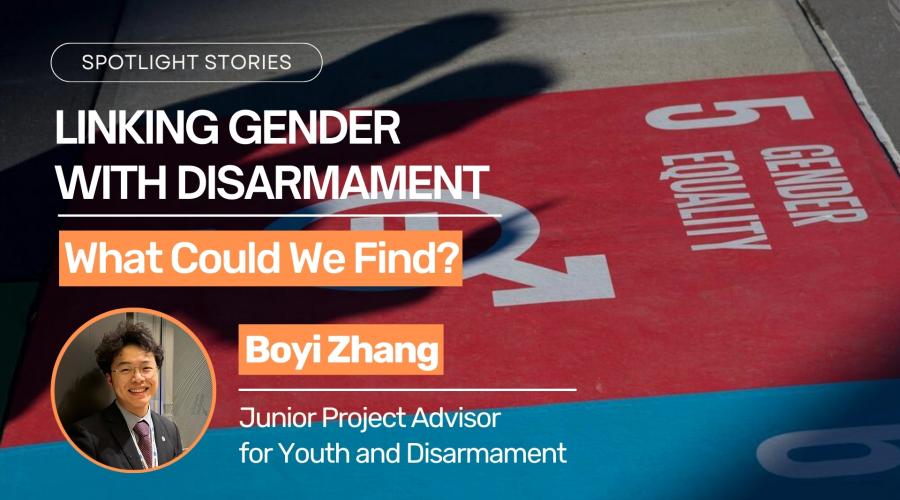
How does gender intersect with disarmament? Frankly, prior to my involvement with the United Nations Office for Disarmament Affairs (UNODA), my understanding of this link was hazy. Yet, delving into disarmament issues through a gender perspective unveils a trove of previously undiscovered insights.
On 14 February 2024, with the strong support from my colleague Ms. Ida Scarpino, I was invited by the Prajnya Trust to give a lecture on Gender and Disarmament as part of the February 2024 edition of the Peace and Gender Lunchtime Lecture series. With this post, I would also like to share some of my findings with you.
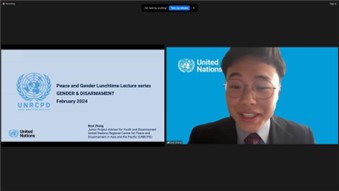
To begin with, weapons of all types impact women and men differently. In terms of conventional weapons, armed conflicts have brought numerous negative consequences. In some parts of the world, the rights of women have been stripped back while in others, women's organizations have been forcibly closed. The ongoing conflicts in many regions have also seen an increase in the risks of Gender-Based Violence (GBV). Simultaneously, within the private sphere, a large number of homicides also affect women disproportionately.
Delving into the realm of Weapons of Mass Destruction, it might be tempting to presume their impact is gender neutral. However, this is not the case. While these weapons do not discriminate based on gender, they exhibit pronounced gender disparities concerning radiation effects, as well as the dynamics of evacuation and resettlement.
In armament and disarmament policy, the first thing we must recognize is that policies are influenced by gender norms, and most of arms-related policymaking is still dominated by men. Women remain underrepresented and make up only approximately one third of participants in multilateral disarmament meetings; even fewer are heads of delegations. Of course, this leads to gender inequality, but it also leads to many policies being associated with masculine characteristics, such as potency, control, power, domination, and strength. Policies with these characteristics are not conducive to today's turbulent world, where counterparts perceived as feminine, such as deliberation, collaboration, and negotiation, can contribute more to global peace and stability.
In recent years, stakeholders, including the United Nations, have been working to increase the participation of women in disarmament decision-making processes. However, this is only the start, and we need to do much more.
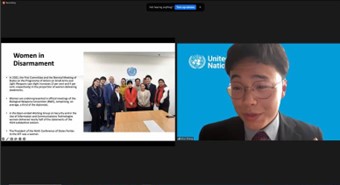
In the Asia and the Pacific region, as UNODA’s regional office, the United Nations Regional Centre for Peace and Disarmament in Asia and the Pacific (UNRCPD) has been actively involved in regional gender mainstreaming for disarmament. UNRCPD has trained a total of 180 government officials, parliamentarians, and civil society representatives on gender mainstreaming and small arms control. Additionally, it has provided substantial support for the review of national policies and laws related to small arms, incorporating a gender perspective. The center has also organized several regional webinars to facilitate discussions on gender issues.
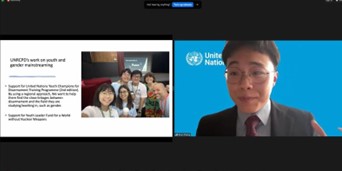
Last but not least, as a youth advocate for disarmament, I firmly believe that gender mainstreaming and youth mainstreaming are intricately linked. Similar to women, young people are highly underrepresented in disarmament. Yet, the meaningful and effective engagement of youth holds immense potential for inclusivity and innovation. By actively involving more young individuals in disarmament initiatives, we can challenge old gender stereotypes and foster better gender-inclusivity.
To achieve this, we can start with the little things. Last September, my colleagues and I went to The British School in Kathmandu, trying to inspire every child to actively engage in disarmament efforts and contribute to global peace and security. I still remember that day when boys and girls renewed their hope for a world without war. Perhaps, this is a good start - bringing disarmament and gender mainstreaming to those around us.
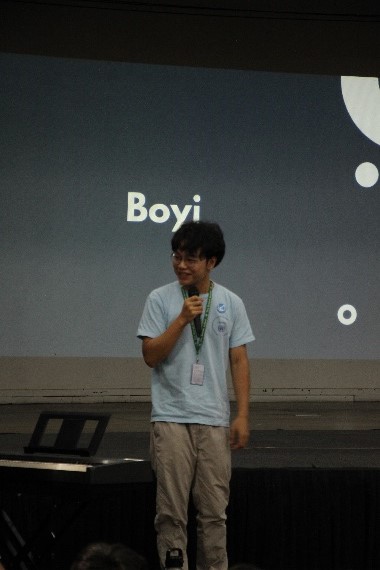
About the author
 Boyi Zhang is currently working as a Junior Project Advisor for Youth and Disarmament with the UN Regional Centre for Peace and Disarmament in Asia and the Pacific (UNRCPD). As a member of the Office’s Youth Team, he is also assisting in both regional and global youth programmes. Boyi is a national of China, currently taking a gap year for his master's degree in International Governance and Diplomacy at Sciences Po. He previously worked as a Political Affairs Intern at UNRCPD for over five months.
Boyi Zhang is currently working as a Junior Project Advisor for Youth and Disarmament with the UN Regional Centre for Peace and Disarmament in Asia and the Pacific (UNRCPD). As a member of the Office’s Youth Team, he is also assisting in both regional and global youth programmes. Boyi is a national of China, currently taking a gap year for his master's degree in International Governance and Diplomacy at Sciences Po. He previously worked as a Political Affairs Intern at UNRCPD for over five months.
Before joining the UN Office for Disarmament Affairs, Boyi worked as a research assistant at the Chinese Academy of International Trade and Economic Cooperation of the Ministry of Commerce of the PRC and the Institute of Area Studies at Peking University. He holds an LLB degree from the University of International Relations in Beijing, China.